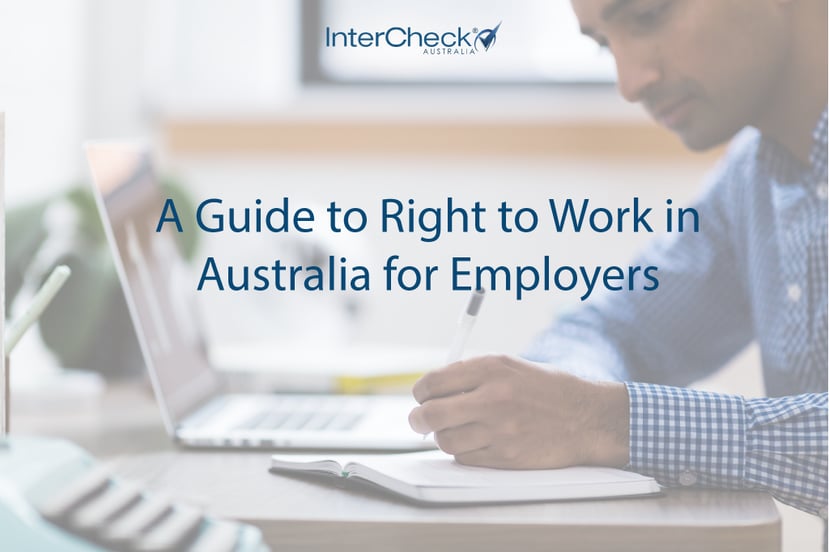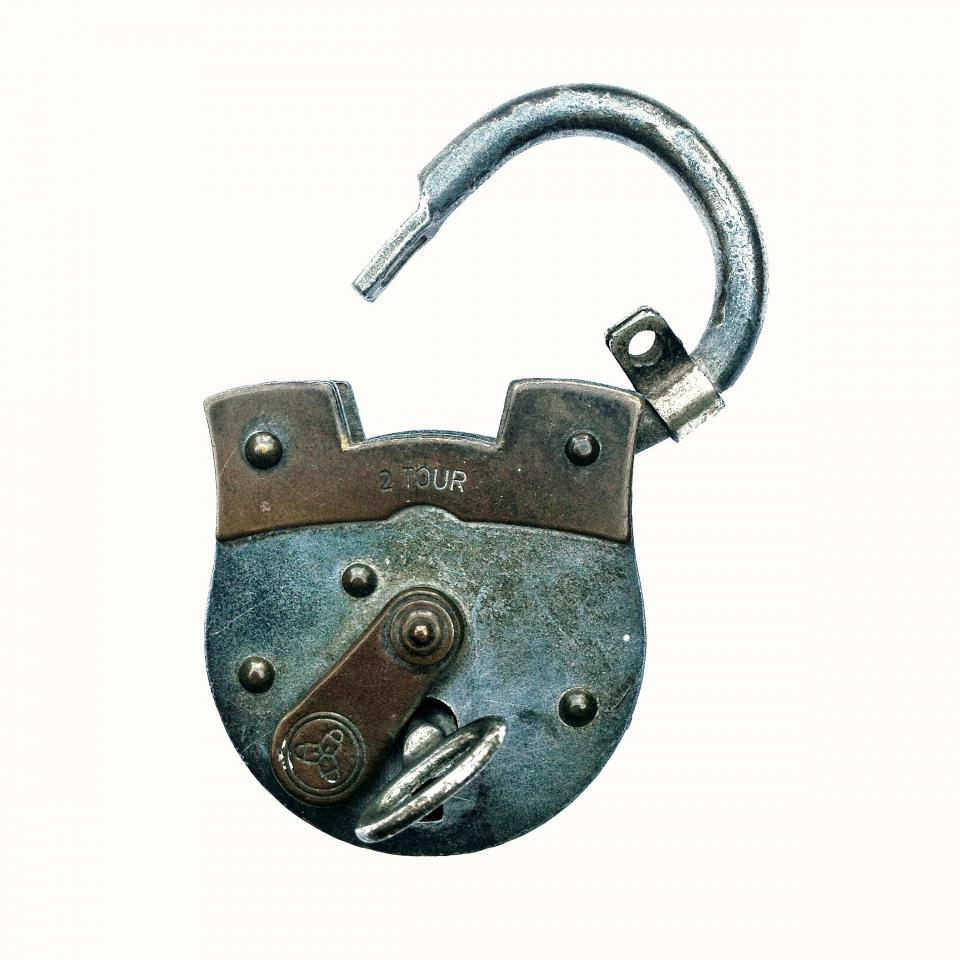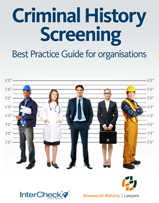
As a business owner, it is your responsibility to ensure that the people you hire to work for you can legally do so. Failure to carry out the right background checks on potential employees can often result in civil penalties or even imprisonment in severe cases.
In this article, we will cover:
- Definition of an "Illegal" legal worker
- Do all Australian employers have to conduct right to work checks on their employees?
- How can an employer check if someone is a permanent residence or citizen?
- And how should employers check work the eligibility of foreign nationals?
- What are the reasonable steps that need to be taken?
-
How often you need to check for the employees’ right to work in Australia?
Government figures show there are nearly 1.9 million people in Australia who hold a temporary visa, an estimated 100,000 of whom are working illegally.
Since amendments to the Migration Act were passed in 2013, the onus has been on employers to take "reasonable steps at reasonable times" to ensure their employees have appropriate work rights.
The sad truth of the employment market is that there are still Australian businesses that are failing in their duties to carry out sufficient checks. Plus, a minority are knowingly breaking the law to take advantage of cheap labour.
So, as an employer that hires foreign staff on a casual or permanent basis, what steps can you take to avoid being on the wrong side of the law? Here is what you need to know.
What exactly is an “illegal” foreign worker?
In a nutshell, the law defines illegal foreign workers as individuals that are “non-citizens” that haven’t got a valid visa that allows them to work in the country.
Some Australian visas have work limitations that could include not being able to work at all or only being able to work with a certain employer or a specific number of hours. For example, a student visa does not allow the applicants to work until their courses have been commenced in Australia. During this time, the applicants do not have the right to work in Australia at all.
It is very important for the business or the hiring manager to check the applicant's’ information carefully and is fully aware of all the restrictions for the visa holders.
If an employer gets caught hiring illegal workers, they can expect penalties ranging from an administrative warning through to a fine of AUD$3,2400 - 270,000 per illegal worker!
Who is entitled to work in Australia?
According to the Department of the Immigration and Border Protection, a legal worker falls into one of these below situations
- Australian citizens, New Zealand citizens and Australian permanent residents
- Some Australian visas have work limitations that could include not being able to work at all or only being able to work with a certain employer or a specific number of hours.
- An Australian visa holder who is not in breach of their visa conditions is also a legal worker or casual roles, but for no longer than six months with any one employer.
In most cases, foreign nationals with Australian visas are allowed to work but only on condition that they do so for a specific employer or a limited number of hours each week.
Do Australian employers have to conduct background checks on all employees?
If an employer is quite certain that the person in question is an Australian or New Zealand citizen, or a permanent resident, they won’t usually need to check if individuals are entitled to work in the country.
To clarify, examples of where an employer can be confident that someone has the right to work in Australia is if:
- They have worked in the country for at least five years;
- They don’t believe the individual is a foreign national;
- The individual states they were born in Australia, and lived there until they were at least 10 years of age;
- The employer can personally confirm the individual has lived in Australia for ten or more years.
How can an employer check if someone is a permanent citizen or resident?
There is a simple way that employers can verify if an individual is a permanent citizen of Australia. All they need to do is request to see one of the following:
- Passport (issued by Australia or New Zealand);
- Australian birth certificate plus a form of photo ID;
- Proof of Australian citizenship (plus a photo ID).
To check residency status, employers can check:
- Certificate of residency status (and a photo ID);
- Passport issued by another country using the VEVO (Visa Entitlement Verification Online) service;
- Driving licence, tax ID number, or Medicare card.
And how should employers check work the eligibility of foreign nationals?
If an employer knows that a job applicant is a foreign national, they need to confirm that the person’s visa allows them to work unrestricted in Australia. The easiest way to do this is by entering the individual’s visa details on the VEVO website.
It goes without saying that checks should get carried out before the employer hires the individual. Employers also have a duty to carry out checks shortly before the foreign national’s visa is about to expire, or if there are a change of circumstances.
How much does it cost to use VEVO?
The Australian government’s VEVO service is absolutely free of charge to use. By submitting a foreign national’s visa details, employers can instantly determine what type of visa the person has, when it was issued, and when it is due to expire.
VEVO will also give details of whether a foreign national has any work restrictions on their visa. Business can register for a business account to access the work entitlements for their employees here:
However, the VEVO service do not offer the management platform for business and often you have to manually check the right to work for every employee. The other disadvantage is the platform do not have the automatically notification system to inform you whenever the right to work of the employees about to expire or have expired.
InterCheck is launching its Right To Work Management platform and you can sign up for FREE Early Bird Access here. This is useful for organisations who employ more than 20 staffs and have foreign workers in their workforce.
Should businesses conduct regular audits of each employee’s work eligibility?
In a word, yes. It doesn’t matter whether or not the individual provided the right documentation to prove their work eligibility at the time of hiring. Employers have a legal duty to ensure their staff have the right to work for them.
Chanesman says employers should beware of four offences:
- Allowing – or continuing to allow – an unlawful non-citizen to work;
- Allowing – or continuing to allow – a non-citizen to work in breach of a work-related visa condition;
- Referring an unlawful non-citizen to work (this could be in the context of an on-hire or labour-hire arrangement); and
- Referring a non-citizen to work in breach of a work-related visa condition
What are the reasonable steps that need to be taken :
- undertaking a VEVO (Visa Entitlement Verification Online) check;
- creating a contractual obligation for another party to verify work permissions;
- creating a contractual obligation for another party to supply persons with the required permission to work in Australia;
- inspecting an Australian passport;
- inspecting a New Zealand passport;
- inspecting an Australian certificate of citizenship, accompanied by a form of identification featuring a photograph of the worker;
- inspecting an Australian birth certificate, accompanied by a form of identification featuring a photograph of the worker;
- inspecting a Certificate of Evidence of Resident Status, accompanied by a form of identification; and
- inspecting a Certificate of Status for New Zealand Citizens in Australia, accompanied by a form of identification featuring a photograph of the worker.
However, it is important to know that it is not sufficient to look at the visa labels to determine the right to work of the visa holder as the government is no longer issued the label even though it is still in circulation.
Note that Checking visa labels in passports prior to employing people does not establish a statutory defence under the legislation.
How often you need to check for the employees’ right to work in Australia:
"Reasonable times" is not defined in the legislation, but Chanesman recommends three-month VEVO checks for employees on bridging visas, and six-month checks for all other visas.
Checks are important because after an employee commences work:
- their visa might expire;
- an event, such as the refusal of a visa application, might cause their bridging visa – and right to work in Australia – to expire;
- they might obtain a further visa with reduced or no work rights; or
- their visa might be cancelled for breach of its conditions.
Employers need to pay attention to employees who is currently under Bridging Visa who are waiting on an outcome, and that outcome could happen today tomorrow or the next day.
The only way that the employer will know is to regularly check the employees’ right to work status.












